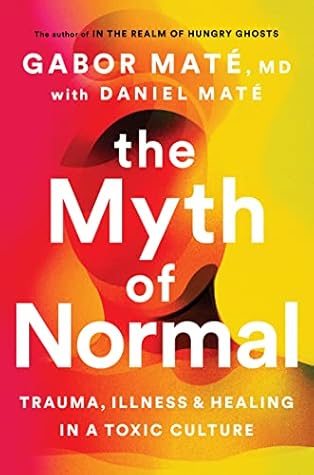More on this book
Community
Kindle Notes & Highlights
by
Gabor Maté
Read between
March 24 - December 30, 2024
I’ve long been taken with reading obituaries in which friends and relatives pay homage to deceased loved ones. I frequently note in these a certain poignant paradox. Composed with affection and sorrow, these moving tributes often reveal and unwittingly celebrate their dearly departed’s self-abnegating traits, without recognizing that these may have played a central role in the illness that ended the life being remembered.
The social context for procreation in our world assigns women untenably stressful roles in every facet of life, including intimate relationships. Besides being the bearers of children, they’ve generally been expected to assuage the psycho-emotional stresses of the men in their lives. Mothering a child may be a mandate from Nature, but mothering a grown man is both unnatural and impossible. No wonder the father’s stress gets outsourced to the mother, at a cost to children and even to the gestating infant.
“You can’t say that parents are incredibly important in the lives of their children, yet if there’s a problem it has nothing to do with the parents. But the truth is, parents don’t raise their children in isolation from society.” A wiser view requires a wider lens. Yes, parents are responsible for their children; no, they did not create the world in which they must parent them.
His seven-year-old son was placed in the youngest class—not because of some developmental delay, but because children younger than seven “don’t receive formal academic training . . . Many are in day care and learn through play, songs, games and conversation.” Once in school, children get a mandated fifteen-minute outdoor recess break for every forty-five minutes of in-class instruction. The educational mantras Doyle remembers hearing the most while there: “‘Let children be children,’ ‘The work of a child is to play,’ and ‘Children learn best through play.’” And as far as outcomes go? Finland
...more
Not daring to rock the boat, we risk sinking with it.
A University of British Columbia study looked at the prescription records of almost one million B.C. schoolchildren over an eleven-year period and found that kids born in December were 39 percent more likely to be diagnosed with ADHD than classmates born the previous January. The reason? December kids entered the same grade nearly a year younger than their January counterparts—they were eleven months behind in brain development. They were being medicated not for a “genetic brain disorder” but for naturally delayed maturation of the brain circuits of attention and self-regulation.[7]
Or consider the DSM-5 diagnosis of oppositional defiant disorder (ODD), often tacked on to ADHD and other “diseases.” “If your child or teenager has a frequent and persistent pattern of anger, irritability, arguing, defiance or vindictiveness toward you and other authority figures, he or she may have oppositional defiant disorder,” advises the Mayo Clinic.[8] The clue is in the word “toward”: oppositionality, by definition, can arise only in the context of a relationship. I can suffer symptoms of a cold in isolation, or break my ankle on my own. I cannot oppose anyone or be angry or irritable
...more
This highlight has been truncated due to consecutive passage length restrictions.
In Kristof’s words, “Our policy was: ‘You get 15 people hooked on opioids, and you’re a thug who deserves to rot in hell; you get 150,000 people hooked, and you’re a marketing genius who deserves a huge bonus.’”[10] It has been broadly established that Big Pharma, such as Purdue, the company controlled by the Sacklers, promoted opiates like OxyContin to doctors as relatively safe analgesics. They did so in full awareness of their drugs’ addictive potential. Over the years, hundreds of thousands of people have died.
“Narcissism and sociopathy describe corporate America,” he told me. “But it’s flat-out wrong to think in twenty-first-century America that narcissism and sociopathy are illnesses. In today’s America, narcissism and sociopathy are strategies. And they’re very successful strategies, especially in business and politics and entertainment.” Call it the myth of abnormal, this notion that somehow these antisocial traits go against the grain; truer to say they are the grain.
The contemporary phrase emotional labor does a great job of conveying the joblike nature of this stress-inducing, externally imposed role. Arguably to an even greater degree than housework and childbirth, this is the proverbial “woman’s work” that “is never done.”
Men’s suffering, too, is part of the patriarchal cycle, in the mix as both effect and cause. The taboo against vulnerability, in particular, is deeply harmful to men as well as to women. Anger may be more permissible among men, but sadness, grief, or “weakness”—which really just means acknowledging one’s limits—are not.
Because trauma affects kids’ ability to learn, a trauma-informed educational system would train teachers to be well versed in the science of development. Education in such a system would encourage an atmosphere where emotional intelligence is valued as highly as intellectual achievement. We would no longer evaluate kids based on performance goals that still mostly reflect and bestow social and racial advantage, but would provide settings where all were encouraged to thrive.


